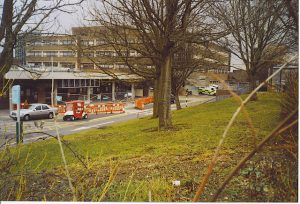A woman said she felt like her mum was “a prisoner” when she couldn’t take her home from a Surrey hospital.
The daughter, who we are choosing not to name, said it felt like the family was caught in a “never-concluding circle” when trying to communicate between NHS trusts to get her mum discharged.
Her mum was in hospital for five months, having been admitted to Guildford’s Royal Surrey County Hospital with pain following breast cancer, but the family living in West Sussex meant a lot of communication about release was across different NHS trusts.
By Colin Smith, CC BY-SA 2.0, https://commons.wikimedia.org/w/index.php?curid=9266476
She told a meeting of the Royal Surrey trust board on Thursday (January 26) that conversations about getting her mum discharged were “awkward” and “difficult” as she tried to negotiate her mum’s release from hospital and whether or not she needed a care plan in place.
Board members apologised for the patient and her daughter’s experience, which included time at Haslemere Hospital, and said the trust would address issues such as communication between themselves and neighbouring trusts. Alexandra Ankrah, NExT director at the trust, sympathised with the woman’s experience, saying she had been through similar with her own mother, though not at Royal Surrey.
Addressing concerns that her mother had felt like a “bed-blocker”, where people who are medically well enough to leave hospital cannot be discharged because there may not be the appropriate social care measures in place at home, she and others in the meeting agreed they did not like the term. Ms Ankrah said: “No one should ever be made to feel that they don’t have a right to our care and services.”
The daughter, who chose not to make a complaint against the trust, said: “I felt like my mum was a prisoner.”
The meeting heard that many patients were in similar situations regarding communication across county borders, and a meeting would be organised using the patient story as a basis to make changes.
The chief executive, Louise Stead, said it came up “every single week” with people caught in “an impossible little maze”. The trust’s medical director, Bill Jewsbury, said getting people home when they were well enough was “really important” because most people wanted to be at home and improved once there. He added: “If we are really honest with ourselves, we are incredibly risk averse around discharge planning.”
Dr Jewsbury said the story was “a classic example” of saying somebody needed a care package in place before they could be discharged but said it would be “quite a powerful driver” for the family to be able to take their relatives home. He said the trust should ask itself: “Have we had that conversation with yourselves as the broader family? [Have we] phrased and pitched it in such a way as: ‘There are going to be some risks involved in perhaps getting your mother home. ‘It isn’t without risk but we can get your mother home.’”
He said it would be “worth trying” and that the hospital could do more to work with families as well as outside groups such as charities and churches in supporting patients.
The hospital’s own virtual wards, where patients can continue to be treated at home and which started late last year, were also raised as one way of helping to tackle the issue.
The daughter told the meeting: “If somebody had presented me with a disclaimer for signing mum out of the hospital, I would have done that.”


